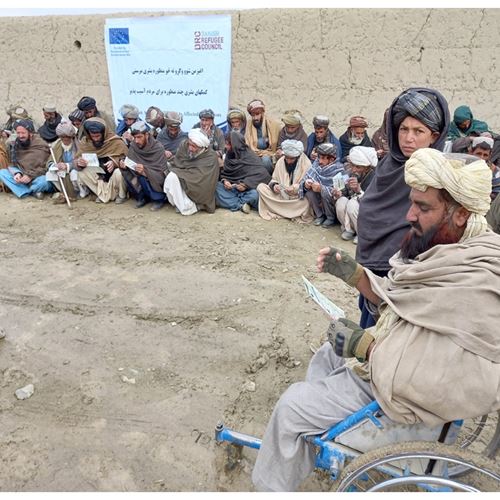It is nearly six years ago, but a memory that is ever present to Nabiullah who is a husband and father of eight. The day he stepped on an explosive device and was severely injured changed his life forever. Nabiullah lost both legs and his ability to work and financially support his family.
Now, bound to a wheelchair, he describes tremendous hardship – yet resilience– during yet another cold and foodless winter. The past months have been particularly challenging, Nabiullah explains, with his family relying on a diet of mostly bread, tea, and yoghurt, often with no choice but to skip meals altogether.
Neglected for decades
DRC meets Nabiullah’s family, alongside 150 other households from their village in Nawa, as they have just received emergency cash assistance under the EU-funded Secure, Accessible First-Line Emergency Response, known as the SAFER project.
Like Nabiullah, all other households in Nawa receiving emergency support are hard hit by multiple crises. Their reality is scarred by decades of conflict, risks from unexploded ordnances, the 2021 drought being the worst in 27 years, and a deepening poverty only worsened since the rapid change in power dynamics in August 2021. Food insecurity is a brutal fact here as well as across most of Afghanistan.
News from Nawa were rare earlier on in this neglected and almost forgotten area, as has been the case with many other remote communities that only now are becoming accessible and possible to help.
Before the new de facto authorities took power, the isolated Nawa district had been under Taliban control for over a decade. Cut off from mobile networks and without a single school, Nawa is a remote and historically underserved district that has previously received little to no humanitarian assistance.
People here describe recurrent and severe shortages of food, health issues, and loss of lives —resonated by the presence of several orphaned children gathered around the area. Nabiullah’s son pushes the wheelchair with his father away from the crowd after receiving the emergency aid grant that will help the family through part of the winter.
DRC will deliver emergency support to around 154,000 vulnerable Afghans in remote areas across 11 of the country’s 34 provinces as part of the SAFER project. In addition to cash assistance provided for families to meet their basic needs, DRC’s Mine Action team will clear areas and reduce threats from explosive remnants of war to make the land safe for those who live there— and prevent families from suffering the way Nabiullah’s has.
